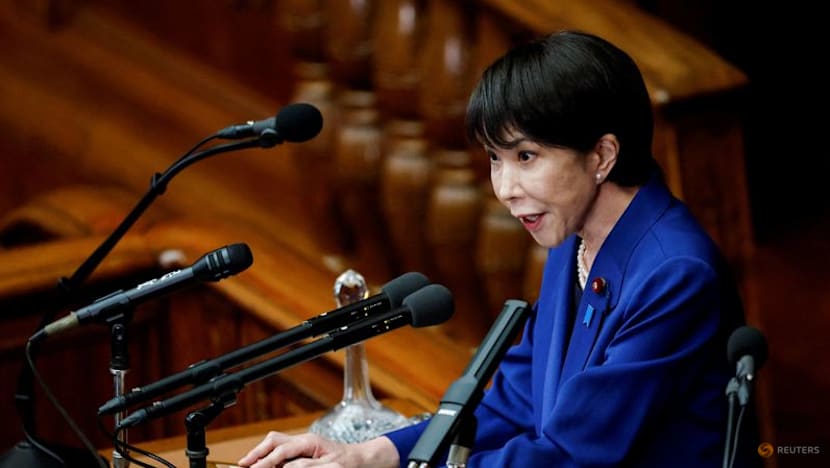New Japan PM vows to take US ties to 'new heights' with Trump

Japan's new Prime Minister Sanae Takaichi delivers her first policy speech in the parliament, in Tokyo, Japan, on Oct 24, 2025. (Photo: Reuters/Kim Kyung-hoon)
TOKYO: Japan's new Prime Minister Sanae Takaichi vowed on Friday (Oct 24) to bring United States ties to "new heights" with President Donald Trump, while taking a swipe at China and vowing a stricter stance on immigration in her first policy speech.
Japan's first woman premier, who so far is enjoying high poll ratings, also told a rowdy parliament that 2 per cent of gross domestic product will be spent on defence this fiscal year, hitting the government's target two years early.
The comments came three days before Trump, who wants Tokyo and other allies to boost their military spending, is due to visit Japan on his way to crunch talks with Chinese President Xi Jinping in South Korea.
Takaichi, whose idol is Margaret Thatcher, said she would build "a relationship of trust" during Trump's visit, "elevating the Japan-US relationship to new heights".
Known before her appointment as a China hawk, Takaichi also said that the military activities of China, North Korea and Russia "have become a grave concern".
"The free, open and stable international order we have grown accustomed to is being profoundly shaken by historic shifts in the balance of power and intensifying geopolitical competition," she said.
China's foreign ministry reacted by hitting out at Japan, increasing its defence budget and relaxing restrictions on arms exports.
"These moves inevitably raise serious doubts among (Japan's) Asian neighbours and the international community about whether Japan is truly committed to an exclusively defensive posture and the path of peaceful development," said spokesman Guo Jiakun.
FLATLINING ECONOMY
But Takaichi also has a host of other complex issues to tackle in the coming months, including a flatlining economy and a declining population.
On Friday, she said the country needed foreign workers to address labour shortages, but alluded to growing anxiety over foreigners in Japan, a country with historically low levels of immigration.
"Some illegal activities and breaches of rules by certain foreigners have created situations where members of the public feel uneasy and perceive unfairness," Takaichi said.
"While we draw a clear line from xenophobia, the government will respond resolutely to such acts," she added, saying they will enforce compliance with existing rules and examine sensitive issues such as land acquisition.
The populist Sanseito party, which calls immigration a "silent invasion", has been making gains in recent elections.
Takaichi has also appointed Kimi Onoda as minister for a "society of well-ordered and harmonious coexistence with foreign nationals", as well as for other areas.
The job existed before, but without a minister in charge. The appointment has led to widespread false information online that Onoda was named minister for "mass deportations".
RISING INFLATION
Ahead of her parliament address, Takaichi had promised to ease pressure on households, saying the cost-of-living squeeze was a priority and telling her Cabinet to draw up measures to address it.
However, there was little further detail on Friday on the promised economic package.
Takaichi's predecessor Shigeru Ishiba survived barely a year in office, with voters hammering the ruling party in elections partly because of rising prices.
Official data on Friday showed inflation accelerated last month, with the consumer price index jumping to 2.9 per cent in September from 2.7 per cent the previous month.
Takaichi has long advocated for more government spending and easing monetary policy to spur growth, and her appointment has boosted stocks to record highs.
Since taking office, however, she has said monetary policy decisions would be left to the Bank of Japan (BoJ).
The BoJ has been "normalising" its super-easy monetary policy, and inflation has been above target for some time, making further interest rate hikes more likely.
But the BoJ is "concerned about the impact of US tariffs on the Japanese economy and the potential for negative spillovers to corporate profits and wage growth", said Abhijit Surya at Capital Economics.
















